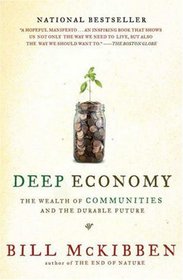Chessa H. (chessa) reviewed Deep Economy: The Wealth of Communities and the Durable Future on + 26 more book reviews
Helpful Score: 2
If I were a rich woman, I would by hundreds of copies of this book to hand out free at busy street corners! Anyone and everyone that is concerned about climate change or peak oil, or is suspicious at all about the "growth always = good" equation of our economists must read this book! Although it has its more terrifying moments, they are tempered by stories of change in small communities all over the world - places where they are making positive changes, for the people, the community at large and the environment. The overarching theme is "farmers markets, not supermarkets" but for EVERYTHING, like radio stations, energy generation, transportation, not just food - he recommends re-localizing our economies and making them deep. Oh and as an aside, if non-fiction isn't normally your gig, I just wanted to add that McKibben is a journalist at heart, and the book is verrrrry readable, not slow or academic-y at all. Read it, read it, read it!
Let me start by saying that I'm not an environmentalist. I believe that this world is here for our enjoyment. That being said I was transfixed by Bill McKibbens vision in this book. He says what I have always believed - the best life is one derived locally: it helps not only the environment but enriches our social and emotional connectedness as well. You can't build a daily relationship with a farmer on the other side of the country but you can do so with someone in your community. The farmer 2000 miles away doesn't know or care when you get laid off or sick but the one next door might cut you a deal in hard times. Additionally, you don't even know if the guy way out there has a family but the one next door might have a kid who could use your kids hand me downs. This sort of thinking seems to me to be the basis for Deep Economy.
McKibben's work is both bleakly terrifying and hopeful at the same time. The juxtaposition of the modern view of successful economy against the rich community found in the 'third world' shows just how diverse McKibben's experiences are. He shows us time and again that more is not necessarily better. In the highly literate and well educated yet financially poor city of Kerala we see that a great community does not require high finance - just the dedication of the populous. In the seemingly lifeless trade city of Yiwu inhabited by millions of products but few true souls we are given a window into the emptiness of American consumerism punctuated by sales slogans in broken English.
Anyone willing to crack this book open will be rewarded with a renewed vision. We each have the power to affect our own community by participating in a local lifestyle which will have the bonus effect of reducing our footprint on the world. In short - why buy fruit from 2000 miles away when you can find it free (or cheap) in your own back yard, or perhaps your neighbors?
McKibben's work is both bleakly terrifying and hopeful at the same time. The juxtaposition of the modern view of successful economy against the rich community found in the 'third world' shows just how diverse McKibben's experiences are. He shows us time and again that more is not necessarily better. In the highly literate and well educated yet financially poor city of Kerala we see that a great community does not require high finance - just the dedication of the populous. In the seemingly lifeless trade city of Yiwu inhabited by millions of products but few true souls we are given a window into the emptiness of American consumerism punctuated by sales slogans in broken English.
Anyone willing to crack this book open will be rewarded with a renewed vision. We each have the power to affect our own community by participating in a local lifestyle which will have the bonus effect of reducing our footprint on the world. In short - why buy fruit from 2000 miles away when you can find it free (or cheap) in your own back yard, or perhaps your neighbors?
Just skimmed it (I have several other of his books in my To-be-read wing of my house. One pithy statement that I like is that money does buy happiness up to $10,000 in income. After that, it can be a reverse correlation.




